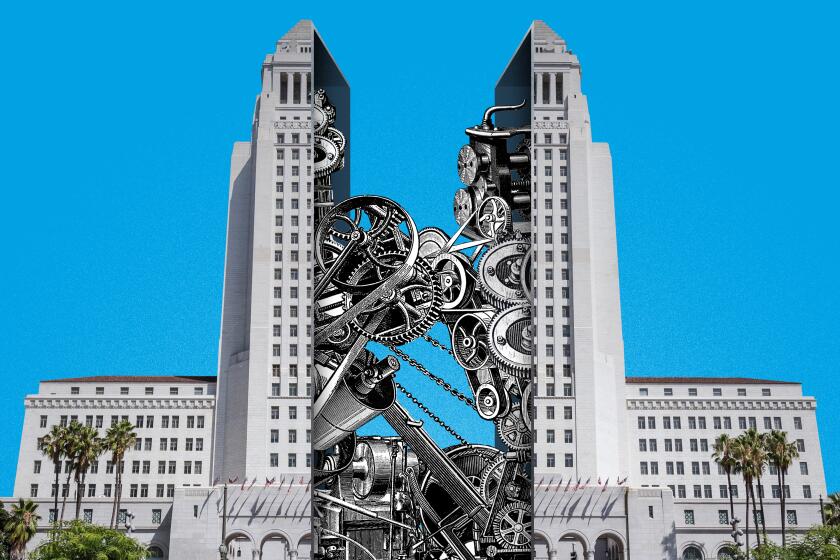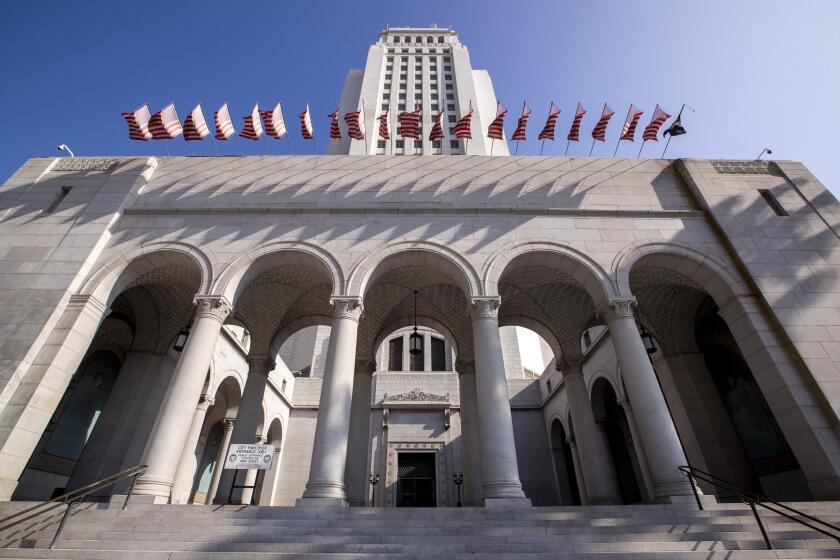L.A. City Hall has a corruption problem. Why are leaders stalling on ethics reform?

- Share via
In just the last few years, two former Los Angeles City Council members have gone to prison for corruption, one more has been sentenced for fraud and bribery and two current members face accusations of ethics violations. At least four high-ranking city officials have pleaded guilty to or been found guilty of roles in various corruption schemes.
It should be obvious that L.A. needs a stronger, more independent Ethics Commission to prevent and penalize corruption and help rebuild public trust in scandal-plagued City Hall. But doing so requires voter support, and time is running out to get a comprehensive reform package on the November ballot.
This is a test for council President Paul Krekorian and his fellow council members’ commitment to fixing City Hall. If they fail to act quickly, it will be clear that they cannot be trusted to make substantial changes to the city’s political structure. Activists and civic leaders will have to organize and impose reform from outside.
Fixing City Hall
Los Angeles City Hall has been rocked by scandal after scandal, but now there’s momentum to reform city government.
The City Council has about two months to sign off on the proposals, which may sound like a long time. But there’s been almost no public discussion of the reforms so far — even though the Ethics Commission approved a dozen proposed changes in August 2022 and, in the wake of the October 2022 leaked audio scandal, almost half the City Council requested that the reforms be put on the ballot. On Friday, Krekorian released his recommendations for ethics reform, which will be heard next week.
What’s been the holdup? It almost seems as if council members don’t really want ethics reform to go to the voters. That’s unacceptable. Angelenos are eager for change — and they deserve it. Eight in 10 voters surveyed last year said the level of corruption on the City Council is concerning, and 9 in 10 believe the city’s ethics rules should be stronger.
The Ethics Commission is the watchdog over the city’s elected officials, candidates for office, political appointees and lobbyists. When the commission was created by voters 30 years ago, it was considered one of the most ambitious reforms in the nation. But now the commission doesn’t have the independence or authority to be the guardian Angelenos need or expect, and it’s time to ask voters to empower the body.
Here are a few of the proposals to do that and why they are needed:
Editorial: Why is the ethically challenged L.A. City Council obstructing the Ethics Commission?
The behind-the-scenes effort to kill an appointment to the city’s oversight panel shows just how much L.A. needs political and ethics reforms.
- The Ethics Commission has been trying for 15 years to update the city’s lobbying law so that paid advocacy is more transparent and the rules are easier to enforce. The City Council has repeatedly refused to consider the proposals. Good-government advocates and academics want to give the commission the authority to bypass the council and put its proposals directly before voters.
- In 2018, a former Ethics Commission staffer filed a whistleblower complaint after being told by managers that a council member had threatened to cut the commission’s budget if it didn’t soften rules on gifts for politicians, according to a Times story. The commission wants to ask voters to approve a minimum annual budget so that staff aren’t dependent on the goodwill of the people they regulate for their funding.
- The City Charter lays out a maximum fine of $5,000 per penalty, which hasn’t been updated in decades and is a pittance in egregious cases. In February, former CBS Chief Executive Leslie Moonves agreed to settle an ethics complaint that he induced an LAPD officer to give him a confidential police report filed by a woman accusing him of sexual assault and then worked with the officer to quash the report. The maximum fine for Moonves’ three violations was $15,000, which is small considering the seriousness of the case. Chicago, for example, set a maximum fine of $20,000 per violation. The Ethics Commission wants to ask voters to double the fine to $10,000 per violation and allow the commission to add penalties to recoup the cost of investigation and enforcement.
This is the result of decisions made by Bass and the City Council. Now they have to be honest about their impact: service cuts, delayed construction projects and higher fees.
Experts have urged additional changes, including increasing the number of commissioners from five to seven and requiring that some are appointed by people other than politicians and thus not beholden to elected officials.
There are more good ideas for strengthening anticorruption rules but not a lot of time left to hash them out. The council has to approve a reform proposal by the middle of June and then finalize the language of the measure by the first week of July to get it on the November ballot.
The City Council should not punt ethics reforms to a yet-to-be-created charter commission, which would delay action even longer. Plus, it’s not clear whether a charter commission could put its proposals directly on the ballot. If not, Ethics Commission changes will have to go through the same City Council process again, and there’s no guarantee the council will ever put meaningful ethics reform on the ballot.
In the wake of the leaked audio scandal, Krekorian was an evangelist for change. He formed the Ad Hoc Committee on Governance Reform, and there was real momentum in City Hall, with good-government groups, civil rights advocates, academics and the public debating how to improve City Hall by expanding the City Council to improve representation and creating an independent redistricting commission.
Yet nearly a year and a half later, the committee has approved just one major reform for the November ballot — the independent redistricting commission. That’s good, but it’s not enough to fix the long-standing problems that have allowed so much corruption to fester in City Hall.
Krekorian and the council cannot let 2024 pass with so little progress. Angelenos were promised reform, and they deserve to vote on reform.
More to Read
Updates
2:31 p.m. April 12, 2024: This editorial was updated with the council president’s proposed ethics reforms, which were released Friday afternoon.
A cure for the common opinion
Get thought-provoking perspectives with our weekly newsletter.
You may occasionally receive promotional content from the Los Angeles Times.












